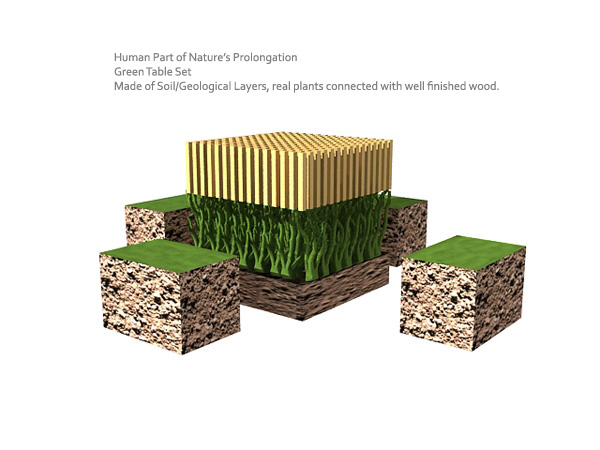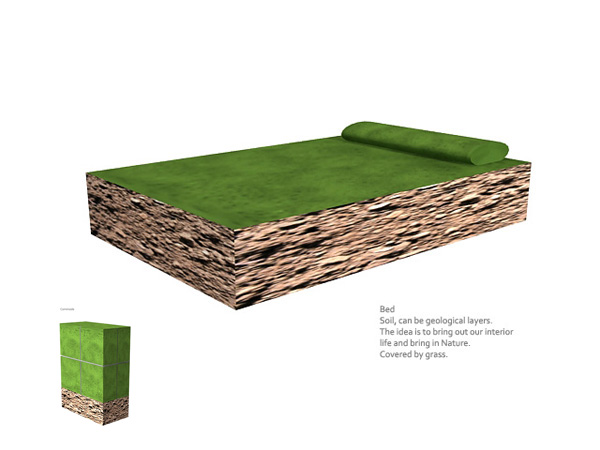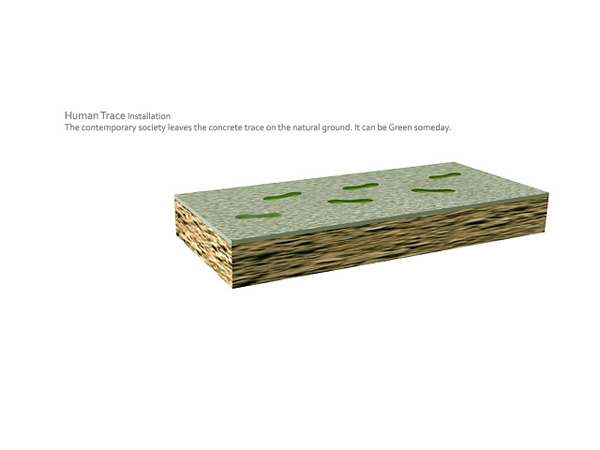
the human part of nature's prolongation by lan laam from vietnam
designer's own words:
The Human Part of Nature’s Prolongation.
I chose to materialize my ideas that I had before by creating these pieces of furniture made of soil, grass and plants… This table represents the evolution of Nature under Human influence from a given level. Nature pushes according to the stable and definite rules, but coming to a certain level, it becomes clean, clear, straight, well cut, well done, well finished, similar to each other, therefore, without emotions, therefore, sterile. What is the point? The aesthetic styles of the world are thus created…
This collection of furniture is for me, non-functional would only have one precise goal. This is here to tell a story. The motivation to consume always more than what we necessarily need is now present in every single society. Unfortunately, it has became a lifestyle. Pleasure is born from the satisfaction of desires, pleasure itself consumes too.
Here, obviously I believe that I have consumed more than what I really need for this collection and I am cheered by having gone through the same process of pollution to denounce it. With the hope that the pollution coming out from the destruction of my pieces of furniture at the end of the “use” will drop a hint. The corporal pollution of the objects would release from it a feature of metaphor of their heart and spirit. Here some pieces of furniture of the collection. They are made of soil, geological layers, plants, wood and greenery…
Nowadays, we do not cease seeing more and more violent and worrying natural phenomena, such as the hurricane Katrina (August 29, 2005) which struck the Southern part of the United States by making many devastations, but also the earthquakes (December 26, 2004) of Sumatra (8,9 on l' scale of Richter) Malaysia, Thailand, Sri Lanka, etc… mortality due to the natural disasters increased by 60% between the years 1980 and the years 2000; this increase number is in particular allotted to the warming of planet.
After the industrial revolution and during economic development, we hardly thought of the environment, which is despite everything, the major factor on which our existence depends. This factor conditions our activities, our movements, and us in general. Do our society which have been designed in a philosophical way and built by the architects evolve/move in the same direction with the environment that surrounds us? We are conscious of our acts but however, we seem to forget to think consequently. The ecological forces do not cease acting and reacting only because we do not think of them. We live separately from the ground with the concrete and the plastic. The rainwater cannot infiltrate any more in the ground of the cities and is led somewhere else by means of pipes. We are in conflict with Nature but at the same time it is predestined to live with because we are part of it.
At this time, we easily see the forest destruction for the wood trade, as well as the ground exploitation for natural ressoures or the dwelling. The trade brings money. The more profitable the business becomes, the less we take account of our completion on Nature, therefore of its consequences. The more we enter the era of new technology, the more we increase the power of our actions. The more we control the conditioning of our life, the less our behavior compared to Nature evolves/moves in the same proportion.
Nature has created us. It nourishes us, it protects us and it will be always the first to play this role of the principal factor which conditions our social, material, sentimental life. At all events, that we are hungry, thirsty, that we are sad, happy or sick…, Nature intervenes voluntarily or involuntarily, directly or indirectly in the programation of a human being. It creates positive or negative significant impacts from the point of view of the history of Man. Positive, when it entirely gives its own resources to nourish and protect us. Negative, when she rebels violently in phenomena and catastrophes, in which, she can steal the life of too many people in one second space of time, quickly and easily. Here is its role briefly described through some perceived aspects of its impact. The behavior of Nature can be observed, studied and anticipated but have we reached the absolute level of anticipation? Definitely Not. Nature, the Earth, the Universe still holds many secrecies for us, human being of unforeseen things which are the daily subject of the scientists.
We are one of the most intelligent beings among all the other animals, we are characterized by our capacity to think, reflect, observe, and react to which, we manages to control part of the ecological structure which exercce on us an significant impact. At the day of today, all the material structure which conditions our life takes the form of a true system of industrialized, computerized and automated machine etc… We benefit from technological advances, which allow an increase in the standard of living in spite of our weaknesses compared to Nature. But, unfortunately beyond the techniques and from the know-how brought by science, we still suffer from the effects created by Nature, including one great part are the consequences of our own actions
Talking about the architectural behavior of Man, the houses, the buildings, the churches, the schools, the hospitals, etc… Are they conceived harmoniously with those which surround them? Is the developed conscience of the interaction between the Man and Nature presents in all the urban projects? Insofar as the Man is unaware of the danger which the technique can present, the human capacity should be limited by codes of conduct forced by the national and international laws. The pure technique must be subjected to ethics.
Nature pushes according to absolutely stable rules and laws. In Nature, all is right, as the leaves leave the tree, the trunk develops. While obeying our know-how, our techniques, we will manage to control Nature progressively and, finally, to integrate harmonously it in our activities, our projects and our existence. We must accept and learn how to live with natural laws because we cannot overcome Nature except when we obey to Her, Francis Bacon said. And after all, the tender of the Man to Nature would remain always one of our greater weaknesses.
Lan Laam
green table set
 green bed
green bed
 human trace
human trace